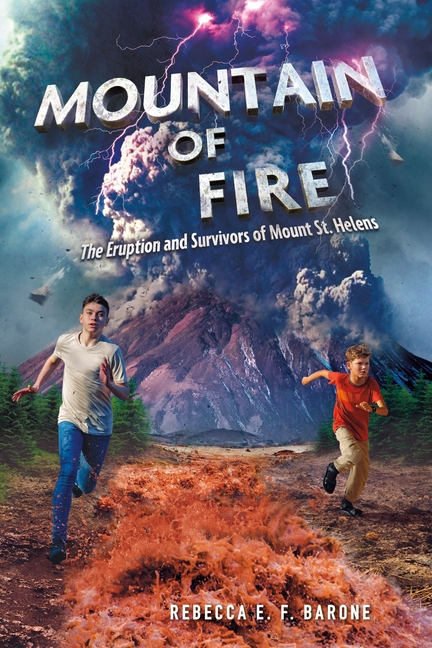
Book Resume
for Mountain of Fire: The Eruption and Survivors of Mount St. Helens by Rebecca E. F. Barone
Professional book information and credentials for Mountain of Fire.
4 Professional Reviews (1 Starred)
2 Book Awards
Selected for 1 State/Province List
See full Book Resume
on TeachingBooks
- School Library Journal:
- Grades 5 and up
- Kirkus:
- Ages 10 and up
- Booklist:
- Grades 5 - 8
- TeachingBooks:*
- Grades 5-8
- Genre:
- Nonfiction
- Year Published:
- 2024
1 Subject Heading
The following 1 subject heading were determined by the U.S. Library of Congress and the Book Industry Study Group (BISAC) to reveal themes from the content of this book (Mountain of Fire).
4 Full Professional Reviews (1 Starred)
The following unabridged reviews are made available under license from their respective rights holders and publishers. Reviews may be used for educational purposes consistent with the fair use doctrine in your jurisdiction, and may not be reproduced or repurposed without permission from the rights holders.
Note: This section may include reviews for related titles (e.g., same author, series, or related edition).
From School Library Journal
Starred review from September 6, 2024
Gr 5 Up-Right from the prologue, author and scientist Barone captivates readers with this narrative nonfiction account from real people involved in the events surrounding the eruption of Mount St. Helens in 1980. Barone also weaves in scientific facts and explanations of certain indicators of volcanic activity in an accessible informative manner for younger audiences. Dramatic tension, whether in the writing, the actual event, or both, builds as readers see the cascade of incidents happen in what feels like real time. Knowing the eventual conclusion of this series of events does not overshadow the uncertainty and unease felt by scientists, law enforcement, tourists, or residents of the area throughout the unpredictable nature and final eruption of the mountain looming above them. Told in a narrative approach, the accounts make readers feel as if they are part of the details and events being shared; this presses the point that some of the people involved could actually be someone readers know. A trigger warning may be necessary: the real-life aftermath of this tragic event is the loss of many lives and the destruction of many communities. VERDICT Don't judge a book by a dated-looking cover. This title is an engaging read and would be good for those seeking to boost nonfiction and historical collections with this explosive title.-Cat Miserendino
Copyright 2024 School Library Journal, LLC Used with permission.
From Horn Book
September 1, 2024
After months of unusual seismic activity, Mount St. Helens erupted on May 18, 1980. The catastrophic results included a thick cloud of ash, debris, devastating mudslides and floods, and more than fifty deaths; the event permanently altered the mountain and the surrounding landscape in Washington State. In a dramatic narrative, Barone tracks the efforts of a devoted team of scientists to observe and record what was happening -- and predict when, if ever, it might happen again. The volcano did, after all, have a history of periodic eruptions over the past several hundred years, which lived in the memory of the Indigenous inhabitants of the region. As the fateful day grew closer, the mountain increasingly drew visitors, creating a dilemma for public officials who wanted to discourage tourism but also provide some degree of freedom for residents and loggers. After the eruption, the book segues into wilderness survival as Barone follows various groups of campers trying to escape the aftermath, while the concluding chapters provide an update on Mount St. Helens today. Barone's engaging narrative contains a wealth of detail and a large cast of characters, but the information is carefully organized into brief paragraphs and short chapters, propelling readers through a story with equal parts science, history, and action. The front matter includes a couple of maps and a list of characters, while an author's note and bibliography are appended. Jonathan Hunt
(Copyright 2024 by The Horn Book, Incorporated, Boston. All rights reserved.)
From Kirkus
April 1, 2024
A chronicle of the history and science behind the Mount St. Helens eruption. In March 1980, Mount St. Helens in Washington state became active. Intermittent earthquakes and ash plumes baffled scientists at the U.S. Geological Survey and frustrated journalists as they sought concrete predictions on what would happen and when. Barone explores how scientists were torn between giving people warning to prepare and inadvertently causing a panic. Once the eruption hits, the prose--which maintains unimpeachable credibility through clear, precise explanations--takes a turn for the cinematic as those dangerously close to the volcano fight for survival. Readers will make frequent use of the frontmatter; maps are helpful in charting the journeys of loggers and campers, and the list of "characters" will allow readers to keep track of the survivors and the legion of scientists trying to unlock the volcano's mysteries. Barone's interviews with key figures make for intense accounts of heart-pounding moments. In explaining what went wrong, the author makes clear that the earthquake was nobody's fault and calls out politicians who falsely claimed that victims of the disaster had chosen to ignore warnings and stayed on the mountain. She ends on a note of hope by discussing what was learned from the eruption both scientifically (how to better monitor for future disasters) and socially (the importance of being able to communicate scientific explanations to laypeople). Rock-solid history and science, high-octane action, and vivid descriptions--the book will inspire as much as it entertains. (websites and QR codes for photos, bibliography) (Nonfiction. 10-adult)
COPYRIGHT(2024) Kirkus Reviews, ALL RIGHTS RESERVED.
From Booklist
March 15, 2024
Grades 5-8 *Starred Review* While the cover suggests historical fiction, Barone's (Race to the Bottom of the Earth, 2021; Unbreakable, 2022) latest narrative-nonfiction endeavor conveys the absorbing events of the Mount St. Helens eruption on May 18, 1980. From interviews with scientists, reporters, campers, and other key participants, Barone pieces together in short, taut chapters, the buildup to the eruption, its devastation, and its aftermath. When an earthquake is detected from the long-dormant volcano 59 days before the eruption, the reaction is mixed. As geologists, volcanologists, seismologists, and landslide experts study ongoing activity around Mount St. Helens and make predictions about a potential eruption, the public wants definitive answers that science can't provide. The palpable frustration and impending doom turn to a highly visceral experience as the eruption ratchets up the intensity. Cliff-hanger chapters graphically describe the demise of some of the 57 people killed and the survival of men, women, and children caught on the mountain during the eruption and subsequent landslides and flooding. Concluding chapters thoughtfully fill in details, such as explanations of geologic occurrences: e.g., the "cone of silence" that directed acoustic energy upward, the area's environmental recovery, lessons learned, and the catastrophe's similarity to the early days of the COVID-19 pandemic. Pulse-racing history that's sure to fascinate any reader.
COPYRIGHT(2024) Booklist, ALL RIGHTS RESERVED.
2 Book Awards & Distinctions
Mountain of Fire was recognized by committees of professional librarians and educators for the following book awards and distinctions.
1 Selection for State & Provincial Recommended Reading Lists
Mountain of Fire was selected by educational and library professionals to be included on the following state/provincial reading lists.
United States Lists (1)
Preview Digital Book
Explore Mountain of Fire on Marketplace. Access requires OverDrive Marketplace login.
This Book Resume for Mountain of Fire is compiled from TeachingBooks, a library of professional resources about children's and young adult books. This page may be shared for educational purposes and must include copyright information. Reviews are made available under license from their respective rights holders and publishers.
*Grade levels are determined by certified librarians utilizing editorial reviews and additional materials. Relevant age ranges vary depending on the learner, the setting, and the intended purpose of a book.
Retrieved from TeachingBooks on January 22, 2025. © 2001-2025 TeachingBooks.net, LLC. All rights reserved by rights holders.


 Junior Library Guild Selections, 2012-2025, High Interest Selection, 2024
Junior Library Guild Selections, 2012-2025, High Interest Selection, 2024
 SLJ Best Books of the Year, 2010 - 2024, Selection, 2024
SLJ Best Books of the Year, 2010 - 2024, Selection, 2024
